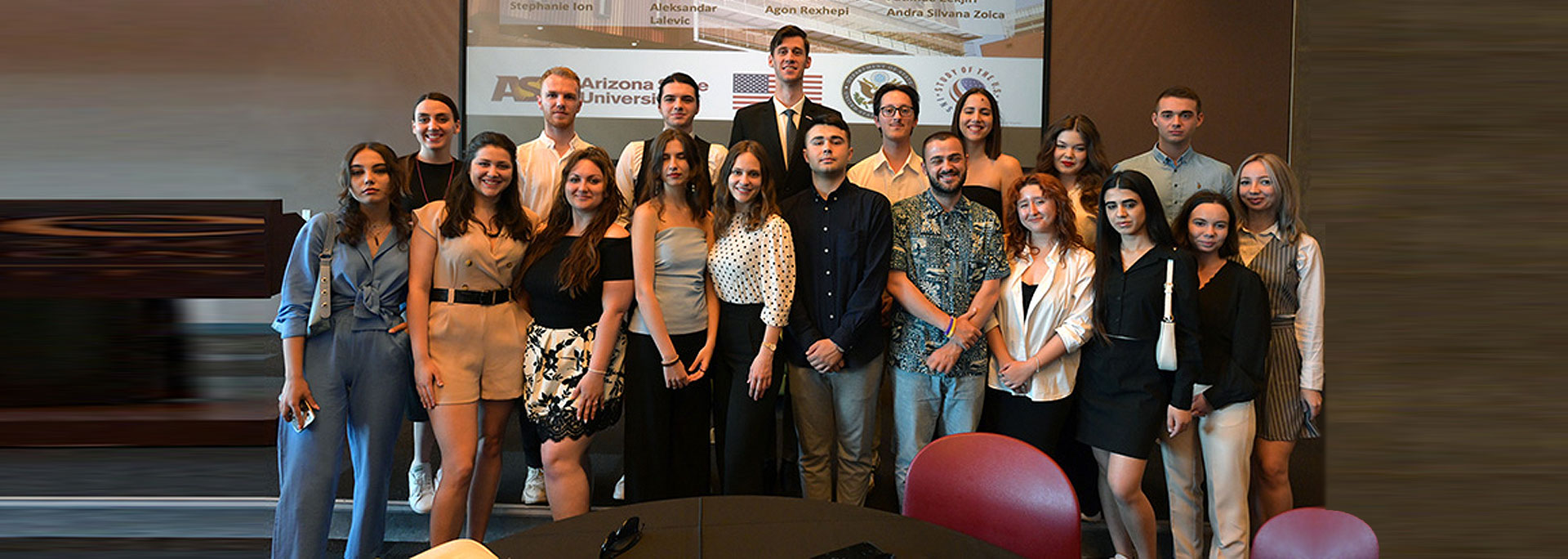Stephanie Ion always wanted to examine the differences between the media in the United States and her home country of Romania.
So when Ion saw the opportunity to apply for a program that would allow her to travel to the U.S. to study the First Amendment and free expression in American media, she took advantage.
Ion is one of 19 international student leaders who attended the Journalism and Media institute, part of the Study of the U.S. Institutes (SUSI) for Student Leaders from Europe program. The SUSI program is sponsored by the U.S. Department of State’s Bureau of Educational and Cultural Affairs and funded by the U.S. Congress. Arizona State University’s Walter Cronkite School of Journalism and Mass Communication hosts the program, which began on June 20 and ended July 26.
The institute allows undergraduate student leaders from Central and Southeast Europe to study media and democracy in the U.S.; it’s part of a larger initiative to promote global leadership and help the students gain a deeper understanding of American values.
Cronkite partners with the Meridian International Center to implement the program. The student leaders who visited Cronkite are from Albania, Bosnia and Herzegovina, Bulgaria, Hungary, Kosovo, Montenegro, North Macedonia, Romania and Serbia.
ASU is one of three universities hosting the SUSI for Student Leaders from Europe program, with each university focusing on a different theme. Michigan State University is hosting an institute examining civic engagement and Shippensburg University is focusing on environmental issues.
During their visit to the Cronkite School, the students developed multimedia projects related to media literacy and other social issues, and participated in community service and cultural events. They toured the Maricopa County Superior Court, visited local newsrooms and listened to lectures from investigative journalists and media scholars.
The students traveled to Washington, DC June 20-24, the Grand Canyon on July 8 and Philadelphia July 22-26.
“We had all the seminars on the U.S. government system related to journalism,” said Ion, who is a distance learning student at the University of Bucharest majoring in advertising. She is also enrolled in-person at Dunarea de Jos University of Galati focusing on naval architecture. “It was interesting to compare the two because what applies here doesn’t apply back home.”
Ion said a discussion with CBS 5 and 3TV investigative journalist and Cronkite faculty associate Morgan Loew about his experiences reporting from the field left a lasting impression.
“Most of the questions were like ‘what is the most dangerous experience you’ve had in your entire career?’” she said. “It was really interesting to learn from his experience because it is not that easy. Investigative journalism is a pretty risky business, and not everyone is suited for that.”
Ion said she learned that American media is more objective than media in Romania, especially when it comes to scrutinizing the government.
“It’s unbiased and it tells the stories the way that they are,” she said. “This is something we really need in our countries.”
Rexhep Kameraj noticed that the presence of investigative and watchdog journalism is more widespread in the U.S. than in Kosovo.
“Journalists are more able to investigate much easier than in Kosovo, and they have a little bit more freedom,” said Kameraj, who is a student at University of Prishtina “Hasan Prishtina” majoring in English Language and Literature. “I know that even here, investigative journalists face a lot of challenges. But I still think that one of the main differences that I noticed from media here and media in Kosovo is the prevalence of Investigative journalism.”
Other students learned similar lessons.
For Filip Došljak, the institute has allowed him to expand his perspective on media literacy, freedom of speech and other social issues while equipping him with the tools to tackle challenges in his home country.
“I want to empower my leadership skills. I want to develop them. And that’s something I would love to use in my own country on different projects and different locations to build a career as a future diplomat or politician,” said Došljak, an International Relations and Political Science major and faculty of Political Sciences at the University of Montenegro. “I want to broaden our people’s horizons. There are so many opportunities and other problems than the ones we are facing. We all need to rethink and look at everything from another point of view.”
Xhensila Dautllari has similar goals of helping people in her country widen their horizons while building a stronger relationship with neighboring countries.
“One thing I want to learn in this program is how to develop my professional skills but at the same time, how to build connections because I think one of the things my country and I think all of the Balkan countries lack is connection between each other,” said Dautllari, who is a student at the Beder College University studying Communication Science. “We are the youth and we have to build bridges between each other so we can connect and be informed.”
